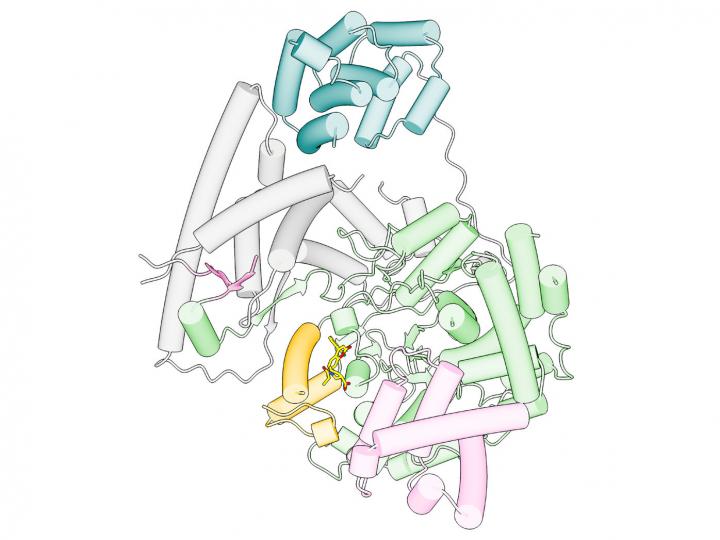Blocking gene expression in mitochondria in mice stops cancer cells from growing

Credit: Hauke S. Hillen
A newly developed compound starves cancer cells by attacking their “power plants” – the so-called mitochondria. The new compound prevents the genetic information within mitochondria from being read. Researchers from the Max Planck Institute for Biology of Ageing in Cologne, the Karolinska Institute in Stockholm and the University of Gothenburg report in their study that this compound could be used as a potential anti-tumour drug in the future; not only in mice but also in human patients.
Mitochondria provide our cells with energy and cellular building blocks necessary for normal tissue and organ function. For a long time, the growth of cancer cells was assumed to be independent of mitochondrial function. However, this long-standing dogma has been challenged in recent years. Especially cancer stem cells are highly dependent on mitochondrial metabolism. Due to the central role of mitochondria for normal tissue function, and because drugs that target mitochondrial functions are usually very toxic, it has so far proven difficult to target mitochondria for cancer treatment.
Now an international team of researchers has found a way to overcome these difficulties. “We managed to establish a potential cancer drug that targets mitochondrial function without severe side effects and without harming healthy cells”, explains Nina Bonekamp, one of the lead authors of the study. Mitochondria contain their own genetic material, the mitochondrial DNA molecules (mtDNA), whose gene expression is mediated by a dedicated set of proteins. One such protein is the enzyme “mitochondrial RNA polymerase”, abbreviated to POLRMT. “Previous findings of our group have shown that rapidly proliferating cells, such as embryonic cells, are very sensitive to inhibition of mtDNA expression, whereas differentiated tissues such as skeletal muscle can tolerate this condition for a surprisingly long time. We reasoned that POLRMT as a key regulator of mtDNA expression might provide a promising target”, says Nils-Göran Larsson, head of the research team.
Compound inhibits mitochondrial RNA polymerase
In collaboration with the Lead Discovery Center, a translational drug discovery organization established by Max Planck Innovation, the research team designed a high-throughput test method for identifying a chemical compound that inhibits POLRMT. The POLRMT inhibitor strongly decreased cancer cell viability and tumour growth in tumour-bearing mice, but was generally well tolerated by the animals. “Our data suggest that we basically starve cancer cells into dying without large toxic side effects, at least for a certain amount of time. This provides us with a potential window of opportunity for treatment of cancer”, says Nina Bonekamp. “Another advantage of our inhibitor is that we exactly know where it binds to POLRMT and what it does to the protein. This is in contrast to some other drugs that are even in clinical use.” With the help of ACUS Laboratories in Cologne and the Max Planck Institute for Biophysical Chemistry in Göttingen, the team identified the chemical binding site of the inhibitor and obtained structural information of the POLRMT-Inhibitor complex.
Bonekamp and Larsson agree that it has been an exciting journey to translate basic findings into a potential drug. They are all the more excited about the possibilities that their findings will open up. “Given the central role of mitochondrial metabolism within the cell, I am sure that our inhibitor of mitochondrial gene expression can be used as a tool in a variety of different areas”, explains Bonekamp. “Of course, it is intriguing to further pursue its potential as an anti-cancer drug, but also as a model compound to further understand the cellular effects of mitochondrial dysfunction and mitochondrial diseases.”
###
Original publication
Nina A. Bonekamp, Bradley Peter, Hauke S. Hillen, Andrea Felser, Tim Bergbrede, Axel Choidas, Moritz Horn, Anke Unger, Raffaella di Lucrezia, Ilian Atanassov, Xinping Li, Uwe Koch, Sascha Menninger, Joanna Boros, Peter Habenberger, Patrick Giavalisco, Patrick Cramer, Martin S. Denzel, Peter Nussbaumer, Bert Klebl, Maria Falkenberg, Claes M. Gustafsson and Nils-Go?ran Larsson.
Small molecule inhibitors of human mitochondrial DNA transcription.
Nature, online publication 16 December 2020
Media Contact
Dr. Nina Bonekamp
[email protected]
Original Source
https:/
Related Journal Article
http://dx.




